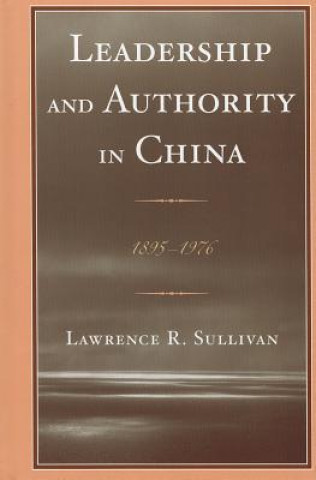
Kód: 01206459
Leadership and Authority in China
Autor Lawrence Sullivan
This volume presents elite conflicts and political controversies in China from 1895 to 1978 as rooted in two diametrically opposed visions of leadership and political authority: a radical, charismatic model that instills absolute ... celý popis
- Jazyk:
 Angličtina
Angličtina - Väzba: Pevná
- Počet strán: 334
Nakladateľ: Lexington Books, 2012
- Viac informácií o knihe

Mohlo by sa vám tiež páčiť
-

CRUSH
20.49 € -

Update on Spine Imaging, An Issue of Magnetic Resonance Imaging Clinics of North America
125.93 € -

It's All One
19.37 € -

Co pít, když ...
5.37 € -25 % -

Zápisník s gumičkou 178x126 mm zlatý s kočárem F
5.37 € -25 % -

Rošťák Bertík Přineees!
6.69 € -15 % -

O POČÁTKU, CESTĚ A ZNAMENÍ ČASŮ
11.86 € -7 %
Darujte túto knihu ešte dnes
- Objednajte knihu a vyberte Zaslať ako darček.
- Obratom obdržíte darovací poukaz na knihu, ktorý môžete ihneď odovzdať obdarovanému.
- Knihu zašleme na adresu obdarovaného, o nič sa nestaráte.
Viac informácií o knihe Leadership and Authority in China
Nákupom získate 465 bodov
 Anotácia knihy
Anotácia knihy
This volume presents elite conflicts and political controversies in China from 1895 to 1978 as rooted in two diametrically opposed visions of leadership and political authority: a radical, charismatic model that instills absolute authority in the single leader whose "will" guides the polity and whose "word" is the basis of policy formulation, versus an institutional model in which authority inheres in organization and where "collective" leadership and decision-making govern the political realm. The former model in modern Chinese history entailed a "leader principle" and personality cult that began with Sun Yatsen and Chiang Kaishek in the Nationalist Party (KMT) and reached its peak with the leadership cult of Chinese Communist Party (CCP) Chairman Mao Zedong, especially during the 1966-1976 Great Proletarian Cultural Revolution. The latter model with its emphasis on "collective leadership" (jiti lingdao) and "administrative rationalism" began as a reaction among early members of the CCP against the promotion of the Sun and Chiang leadership cults and became a central governing principle in the Communist Party that served as official leadership doctrine beginning with the formation of the Party in 1921. While tensions over leadership issues were relatively muted in the pre-1949 period and early 1950s of CCP history as an apparent "compromise" was reached in which from 1943 onward a cult of the leader was promoted for propaganda purposes but with collegial decision-making governing inner Party decision-making, the mid-to-late 1950s saw this "compromise" among the top leadership come under increasing strain and finally break down. Devoted to a fundamentally different vision of a "socialist" China from other top leaders on a number of economic, social, and political fronts, Mao Zedong pushed his domination of the policy process that ultimately provoked a wholesale assault on the CCP apparatus throughout the country while the leader cult reached mythic proportions during the Cultural Revolution. Confronted by the possibility of civil war and generally opposed to the takeover of the polity by the radical Gang of Four led by his wife Jiang Qing, by the mid-1970s the aging great leader acquiesced to the rebuilding of the CCP along traditional, "institutional" lines.
 Parametre knihy
Parametre knihy
Zaradenie knihy Knihy po anglicky Humanities History Regional & national history
186.52 €
- Celý názov: Leadership and Authority in China
- Autor: Lawrence Sullivan
- Jazyk:
 Angličtina
Angličtina - Väzba: Pevná
- Počet strán: 334
- EAN: 9780739171547
- ISBN: 0739171542
- ID: 01206459
- Nakladateľ: Lexington Books
- Hmotnosť: 672 g
- Rozmery: 236 × 158 × 27 mm
- Dátum vydania: 13. July 2012
Obľúbené z iného súdka
-

Hundred Years' War on Palestine
13.18 € -23 % -

Ethnic Cleansing of Palestine
12.88 € -23 % -

History of Japan
16.94 € -15 % -

Ten Myths About Israel
13.49 € -14 % -

Strange Death of Europe
15.21 € -21 % -

Decline and Fall of the Roman Empire
5.98 € -19 % -

Secret History
13.69 € -21 % -

God's Playground A History of Poland
68.19 € -

Mayflower
15.62 € -23 % -

How to be a Victorian
14.30 € -23 % -

Plantagenets
13.39 € -28 % -

General's Son
20.39 € -3 % -

Iran: A Very Short Introduction
11.46 € -19 % -

Temples of Karnak
152.42 € -

Cuneiform
11.05 € -23 % -

Twenty Years A-Growing
10.04 € -22 % -

History of Witchcraft in England from 1558 to 1718
18.87 € -

Bohemian Paris
16.63 € -17 % -

China in Africa
37.13 € -

Islandman
11.05 € -19 % -

Lancaster And York
22.72 € -

Alexiad
17.65 € -20 % -

Modern France: A Very Short Introduction
11.46 € -19 % -

Inside Hitler's Greece
20.90 € -20 % -

Diana: Her True Story - In Her Own Words
11.05 € -23 % -

The Fourth Turning
19.58 € -5 % -

The Oxford History of Ancient Egypt
15.31 € -23 % -

Churchill: The Power of Words
15.31 € -20 % -

Palestine
20.29 € -19 % -

Korean History in Maps
28 € -9 % -

Great Gatsby (Wisehouse Classics Edition)
16.13 € -36 % -

Viking Way
45.86 € -7 % -

The Thirteenth Tribe
14.81 € -

My Promised Land
18.46 € -

Vanished Kingdoms
19.07 € -21 % -

Age Of Revolution
16.43 € -23 % -

Life and Death of Anne Boleyn
23.13 € -

Coming of the Third Reich
16.33 € -25 % -

Children of Ash and Elm
18.56 € -23 % -

Europe Between the Oceans
34.19 € -6 % -

Socialism Betrayed
19.37 € -19 % -

303 Squadron
18.56 € -23 % -

Ancient Celts, Second Edition
26.58 € -19 % -

Dancing in the Glory of Monsters
15.82 € -22 % -

Battle of Britain: Luftwaffe Blitz (Images of War)
25.67 € -1 % -

Age of Confucian Rule
35.71 € -

Beyond Band of Brothers
16.43 € -23 % -

Benjamin Franklin
18.76 € -12 % -

On China
17.24 € -20 %
Osobný odber Bratislava a 2642 dalších
Copyright ©2008-24 najlacnejsie-knihy.sk Všetky práva vyhradenéSúkromieCookies



 21 miliónov titulov
21 miliónov titulov Vrátenie do mesiaca
Vrátenie do mesiaca 02/210 210 99 (8-15.30h)
02/210 210 99 (8-15.30h)